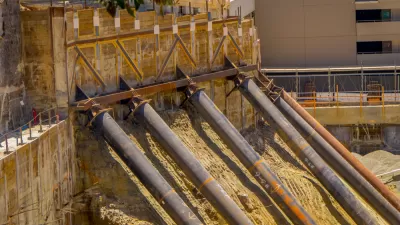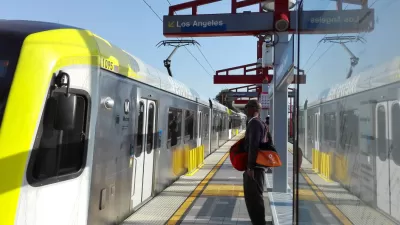L.A. voters approved Measure JJJ in 2016 in the hopes of encouraging more affordable housing as a trade-off for discretionary approval. The result has been no development at all.

"Housing production in Los Angeles has slowed in the two years since Measure JJJ took effect, reports Steven Sharp, sharing research from the University of California Berkeley's College of Environmental Design and Los Angeles-based thinktank LAplus.
"The ballot measure, which was approved by 65 percent of voters in the November 2016 election, requires that all Los Angeles developments seeking zone changes or general plan amendments employ prevailing wage labor and set aside a percentage of residential units for lower-income households," according to Sharp's explanation.
While 19,000 such projects were proposed from 2016 to 2017, they've since "ground to a halt."
Sharp explains why: "Few projects have filed for entitlements under the Measure JJJ rules, and only one project has been approved to date. Citing interviews with several developers, the report points to Measure JJJ's prevailing wage requirement as the primary impediment to the use of zone changes and general plan amendments."
Some of that lost production has been offset by the city's Transit Oriented Communities guidelines, which were also enacted by Measure JJJ and have shown positive early returns. According to the report, however, development in the city overall has declined by 11.3 percent since Measure JJJ took effect.
FULL STORY: Study: Housing Production Slows in Los Angeles Following Passage of Measure JJJ

Study: Maui’s Plan to Convert Vacation Rentals to Long-Term Housing Could Cause Nearly $1 Billion Economic Loss
The plan would reduce visitor accommodation by 25% resulting in 1,900 jobs lost.

Alabama: Trump Terminates Settlements for Black Communities Harmed By Raw Sewage
Trump deemed the landmark civil rights agreement “illegal DEI and environmental justice policy.”

Why Should We Subsidize Public Transportation?
Many public transit agencies face financial stress due to rising costs, declining fare revenue, and declining subsidies. Transit advocates must provide a strong business case for increasing public transit funding.

Paris Bike Boom Leads to Steep Drop in Air Pollution
The French city’s air quality has improved dramatically in the past 20 years, coinciding with a growth in cycling.

Why Housing Costs More to Build in California Than in Texas
Hard costs like labor and materials combined with ‘soft’ costs such as permitting make building in the San Francisco Bay Area almost three times as costly as in Texas cities.

San Diego County Sees a Rise in Urban Coyotes
San Diego County experiences a rise in urban coyotes, as sightings become prevalent throughout its urban neighbourhoods and surrounding areas.
Urban Design for Planners 1: Software Tools
This six-course series explores essential urban design concepts using open source software and equips planners with the tools they need to participate fully in the urban design process.
Planning for Universal Design
Learn the tools for implementing Universal Design in planning regulations.
Smith Gee Studio
Alamo Area Metropolitan Planning Organization
City of Santa Clarita
Institute for Housing and Urban Development Studies (IHS)
City of Grandview
Harvard GSD Executive Education
Toledo-Lucas County Plan Commissions
Salt Lake City
NYU Wagner Graduate School of Public Service




























